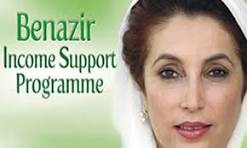Benazir income support Welcome to a comprehensive guide on the Benazir Income Support Programme (BISP), a beacon of hope for many families in Pakistan. Join us as we delve into the history, impact, challenges, and future plans of this vital social welfare initiative that has been changing lives and combating poverty in the country. Get ready to explore how BISP is making a difference one beneficiary at a time!

History and Purpose of BISP
The Benazir Income Support Programme (BISP) was established in 2008 by the Government of Pakistan with the aim of providing financial assistance to vulnerable families across the country. Named after former Prime Minister Benazir Bhutto, the program holds a significant place in Pakistan’s social welfare initiatives.
The primary purpose of BISP is to alleviate poverty and empower marginalized communities by offering cash transfers to eligible beneficiaries. By targeting women specifically, BISP aims to enhance their economic participation and decision-making within households, ultimately leading to improved living standards for families.
Over the years, BISP has evolved into one of Pakistan’s largest social safety net programs, reaching millions of households in need. Through its targeted approach and transparent mechanisms, BISP continues to play a crucial role in reducing poverty levels and promoting socio-economic development nationwide.
Eligibility Criteria for Receiving Benefits from BISP
If you are wondering about the eligibility criteria for receiving benefits from the Benazir Income Support Programme (BISP), here’s what you need to know. To qualify for assistance, individuals must fall below a certain poverty threshold set by the program. This means that only those who truly require help are able to benefit from BISP.
Additionally, applicants must be Pakistani citizens and provide valid proof of identity. The program aims to support those who are most in need, so strict verification processes are in place to ensure transparency and fairness in distribution.
Furthermore, priority is given to marginalized groups such as widows, orphans, persons with disabilities, and other vulnerable segments of society. By targeting these specific demographics, BISP can effectively reach those facing the highest levels of poverty and deprivation.
The eligibility criteria for BISP aim to assist those who are struggling the most while ensuring accountability and efficiency in delivering social welfare benefits.
Impact of BISP on Poverty Alleviation in Pakistan
The Benazir Income Support Programme (BISP) has had a significant impact on poverty alleviation in Pakistan. By providing financial assistance to vulnerable families, BISP has helped alleviate the economic burden and improve their quality of life. Many beneficiaries have been able to meet their basic needs such as food, education, and healthcare due to the support received from BISP.
Through regular cash transfers, BISP has empowered individuals by giving them the means to lift themselves out of poverty and create a better future for themselves and their families. This targeted approach towards poverty reduction has led to positive outcomes in terms of social development and well-being across various communities in Pakistan.
Moreover, by promoting financial inclusion and stability among low-income households, BISP has contributed towards reducing inequalities in society. The programme’s efforts have not only improved living standards but also fostered a sense of dignity and self-reliance among its recipients.
The impact of BISP on poverty alleviation is evident through the tangible improvements witnessed in the lives of countless individuals who have benefitted from this vital social safety net.
Challenges Faced by BISP
The Benazir Income Support Programme (BISP) has undoubtedly made significant strides in poverty alleviation in Pakistan. However, like any initiative of such scale and importance, it faces its fair share of challenges.
One major challenge is ensuring the accurate targeting of beneficiaries. Identifying those who are truly deserving can be a complex task, leading to potential errors in distribution. Additionally, there have been concerns raised about leakages and corruption within the system, which can hinder the program’s effectiveness.
Another challenge lies in sustaining support for BISP amidst economic fluctuations and budget constraints. Securing adequate funding to continue providing assistance to millions of vulnerable individuals remains a constant struggle.
Furthermore, there is a need to enhance transparency and accountability within BISP to build trust among stakeholders and ensure that resources are allocated efficiently. Overcoming these challenges will be crucial for BISP to maintain its positive impact on social welfare in Pakistan.
Success Stories and Testimonials from BISP Beneficiaries
The Benazir Income Support Programme (BISP) has touched the lives of countless individuals in Pakistan, providing them with a safety net during challenging times. Through BISP, many beneficiaries have been able to access financial assistance that has helped them meet their basic needs and improve their quality of life.
One success story is that of Saima, a single mother who was struggling to make ends meet after losing her job. With the support from BISP, she was able to start a small tailoring business from home and now earns enough to support her family.
Another testimonial comes from Ali, a student whose education was at risk due to financial constraints. Thanks to BISP’s educational grants, he was able to continue his studies and pursue his dream of becoming a doctor.
These stories are just a glimpse of the positive impact BISP has had on individuals across Pakistan. By sharing these testimonials, we highlight the real-life changes that this program brings about for those in need.
Criticisms and Controversies Surrounding BISP
The Benazir Income Support Programme (BISP) has undoubtedly made significant strides in poverty alleviation in Pakistan. However, like any large-scale welfare initiative, it has not been devoid of criticisms and controversies.
Some critics argue that the BISP may foster dependency among beneficiaries, discouraging them from seeking employment or becoming self-reliant. There are concerns about transparency and accountability in the distribution of funds, with reports of potential misuse and corruption within the system.
Moreover, there have been debates regarding the sustainability of the programme in the long run. Critics question whether cash transfers alone can address systemic issues such as low education levels, lack of healthcare access, and limited job opportunities for vulnerable populations.
Despite these criticisms and controversies, supporters of BISP highlight its undeniable impact on reducing immediate poverty levels and providing a safety net for marginalized communities across Pakistan. As discussions continue on how to improve and optimize social welfare initiatives like BISP, it is crucial to consider diverse perspectives to ensure effective implementation and equitable outcomes for all beneficiaries.
Future Plans for BISP and its Role in Social Welfare in
Moving forward, BISP aims to strengthen its monitoring and evaluation mechanisms to ensure that benefits reach those who need them the most. By leveraging technology and data analytics, BISP seeks to enhance transparency, efficiency, and accountability in delivering support services.
Moreover, BISP will continue collaborating with local communities, civil society organizations, and government agencies to create sustainable solutions for poverty alleviation.
In conclusion,Benazir Income Support Programme remains a beacon of hope for millions of vulnerable families across Pakistan. Through its unwavering commitment to social welfare and poverty alleviation, BISP embodies the spirit of compassion and solidarity that defines a just society. As we look towards the future, let us support initiatives like BISP that strive to create a more inclusive and prosperous nation for all its citizens.



